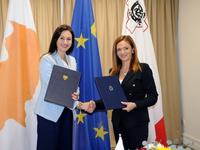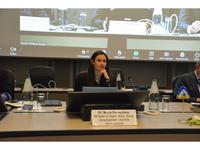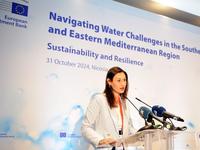Press Releases
06-03-2024 18:14
Speech by the Minister of Agriculture, Rural Development and the Environment, Dr Maria Panayiotou, at the International Women’s Day event of the Sovereign Base Areas Administration, at Episkopi
It is my great pleasure and honour to address today’s event celebrating International Women’s Day, organised by the Sovereign Base Areas Administration, at Episkopi.
Thank you for the invitation and for the opportunity to be here and contribute to highlighting the importance of inclusivity and the empowerment of women, not only within the environmental and agricultural sectors, but across all facets of society and work environments. I do hope that my speech will provide invaluable insights to today’s esteemed audience, which is notably diverse, encompassing UK military and civilian personnel, Cypriot staff and contractors who work with British Forces Cyprus and members of the wider community.
I wish to extend my congratulations to the Sovereign Base Areas Administration and in particular to its Administrator and Commander of the British Forces Cyprus, AVM Pete Squires, and Chief Officer of the Sovereign Base Areas, Mrs Clare Simpson, for hosting this event and formal dinner that will follow. Such events form part of celebrations worldwide for the triumphs of women across social, economic, cultural and political spheres, reminding us of the progress made towards gender equality and highlighting, at the same time, the ongoing efforts required to continue this progress.
This year's campaign theme, “Inspire Inclusion”, highlights the significance of embracing diversity and promoting empowerment across various sectors of society and all aspects of life. At the same time, it points to the vital role of inclusion towards achieving gender equality, urging initiatives to remove obstacles, confront stereotypes and create societies where every woman is appreciated and respected. Furthermore, “Inspire Inclusion” motivates individuals to acknowledge and value the distinct insights and contributions of women from diverse backgrounds, especially those from under-represented groups.
As clearly stated in the programme of governance of the President of the Republic, Mr Nikos Christodoulides, the horizontal promotion of gender equality across all aspects of society is a top priority for the Republic of Cyprus and for the President himself. To this end, a new National Strategy on Gender Equality has been approved by the Council of Ministers and was entered into force in January 2024, which aims at a horizontal gender mainstreaming in government policies. Furthermore, the Government’s Ministers, Deputy Ministers and Commissioners signed and adopted a Policy Declaration on gender equality and zero tolerance for any sexist or harassing behaviours based on gender, taking a step further in their efforts to accelerate the promotion of equality between women and men in our country.
Εven though progress has been made across the globe regarding gender equality, discrimination against women continues to exist in the world of business. No country in the world or in the European Union (EU) has achieved substantive and complete gender equality. The continued existence of discrimination against women in the workplace reflects deeply rooted social structures and cultural beliefs that reproduce gender inequalities. Despite progress made in eliminating discrimination, women continue to face significant barriers in their professional advancement and in achieving equality in terms of both their compensation and the opportunities available to them.
In Cyprus, this is evidenced by the fact that women are paid 9.7% less than men. The wage gap is found to vary by professional activity, where according to the Statistical Service (2018) it amounts to 13.6% among managerial staff, men and women. This gap reflects not only the differences in pay for the same or equivalent work, but also the different opportunities for advancement and taking on leadership roles. Beyond the wage gap, there continues to be professional segregation into "male-dominated" and "female-dominated" professions, where the latter are usually paid lower. This segregation is directly linked to the educational choices made by girls and boys, which are influenced by cultural stereotypes and social expectations.
It is noted that, as part of its obligation, the Republic of Cyprus will incorporate into its national law two European directives concerning pay transparency and the introduction of a quota for the participation of the under-represented gender in the boards of directors of companies listed on the stock exchange with a large number of employees. The Republic of Cyprus will contribute in this way to bridging the gender gap. In the same direction, the Office of the Commissioner for Gender Equality, through awareness campaigns, promotes women in professions where there appears to be reduced participation.
Another critical aspect of gender equality that needs to be addressed is the fact that women are more vulnerable to crises than men. The Covid-19 pandemic and the climate crisis have demonstrated that women are affected more severely and in different ways by crises compared to men. At the same time, women are less represented in decision-making centres dealing with the management of these crises.
In my capacity as Minister of Environment, and in my previous capacity as Commissioner for the Environment, I have come to learn that gender equality and environmental protection are two topics that are inextricably linked. In reality, both are implemented or should be implemented horizontally in every aspect and manifestation of our daily lives. At the same time, the measurable impact of climate crisis on gender equality has already been recorded: Women are often more vulnerable to the impacts of climate change, such as extreme weather disasters and environmental degradation. The impacts manifest in various ways, from increased health risks due to climate-related diseases to increased economic vulnerability, particularly in poor or rural areas. Also, women in many societies have limited access to resources and opportunities, which can have negative effects on their ability to participate in decisions affecting the environment. Additionally, inequality in the distribution of both resources and benefits from sustainable development is often problematic. Finally, access to education for women is directly related to their ability to participate in environmental initiatives as education empowers women to contribute to environmental protection.
Therefore, in light of the climate crisis, it is imperative that we take the necessary measures to address its consequences from a gender perspective. Integrating both the environmental impact and the gender perspective in all aspects of policies and initiatives can ensure preventive action to reduce environmental pressures and all forms of inequality. At the same time, we must inform and raise awareness among women about the impact of climate change on gender equality and encourage women’s participation in actions and initiatives concerning the management of climate crisis.
On another note, female entrepreneurship in Cyprus has already shown positive signs and is a sector that needs to be supported in order to develop fully and effectively with all the benefits this entails for innovation, job creation and strengthening the position of women in society. In my capacity as Minister of Agriculture and Rural Development, promoting and encouraging female entrepreneurship in the agricultural sector is one of my priority goals. I have been privileged to witness firsthand the entrepreneurial spirit of women who are the backbone of our rural communities, protecting the environment and working towards sustainable development. Women in the agricultural sector have already proven that they enhance the sustainability and productivity of agriculture. Many female farmers focus on sustainable farming practices, contributing to environmental protection and the promotion of organic farming. Additionally, female entrepreneurship in the agricultural sector can strengthen local communities, creating economic opportunities and promoting local products and consumption. It is particularly encouraging that the number of women interested in receiving subsidies, as part of the Rural Development Programme, either as heads of agricultural operations or as heads of agricultural product processing units, is increasing over time. A characteristic example is the significant number of spoon sweets manufacturing units that operate fully adhering to the principles of the circular economy.
Finally, given that this year's campaign focuses on breaking down barriers and challenging stereotypes, it is important to highlight that women often face stereotypical perceptions regarding their leadership abilities, which may lead to more frequent questioning of their decisions compared to their male counterparts. This is supported by research, which shows that women in managerial positions are more easily questioned regarding their decisions and appear to be accountable for much more than their male peers.
Another difficulty that affects all working women, not only those in managerial positions, is the "glass ceiling" phenomenon. Women often encounter invisible barriers to their promotion to higher positions. This includes balancing their professional and personal life. Traditional gender roles often place the greater burden of family obligations on women, limiting the time and energy they can dedicate to their professional advancement. Quantitative data confirm that women's personal time is more limited than that of men, which is directly related to perceptions and the stereotypical roles attributed to and expected of men and women in society.
Therefore, as a State, we are working, according to the programme of governance, to promote gender equality, empower women and create a fairer and more balanced working environment. Specifically, in the new National Strategy on Gender Equality, coordinated by the Office of the Commissioner for Gender Equality, actions are included that aim to empower women at various levels and contribute to the reconciliation of professional and personal life. Among other things, the Office of the Commissioner for Gender Equality contributes, through strategic partnerships, to the efforts of private companies to proceed with the implementation of action plans with the goal of shaping a gender-sensitive environment in companies, respecting the different needs of men and women and recognising that women and men contribute equally to their professional fields. Additionally, the Deputy Ministry of Social Welfare promotes care structures for the elderly, childcare centres and adult care centres for individuals with long-term care needs, structures that will contribute to the reconciliation of family and professional life for both female and male employees.
Today we celebrate the diversity of roles that women play not just on our island, but across the globe. From the fields to the classrooms, from the laboratories to the boardrooms, women can lead the way in creating a sustainable future for our planet. Our aim is not only to increase understanding and appreciation for women’s inclusion, but to inspire each one of us, regardless of gender, to advocate for and enact change. Inclusion is not a women's issue; it is a human issue. And it is crucial for the sustainability of our communities, our economies and our environment.
(EN/GS/EP)
Relevant Press Releases









